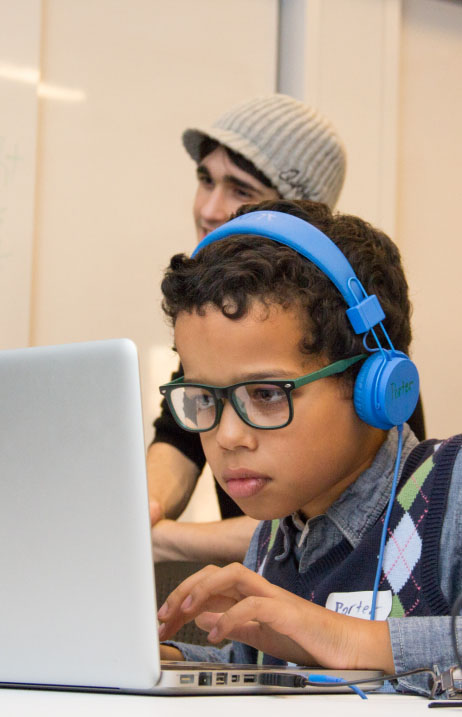A New Minor is Major News for Students Seeking to Put Technology in Service to Society
Starting this fall, aspiring engineers at Tandon have the option of earning a minor in Disabilities Studies, thanks to a new multi-school interdisciplinary program intended to educate them about the historical, social, and legal circumstances that shape the experience of disability — and help them discover ways in which they can put their engineering knowledge to use in the field. Understanding the issues faced by the well over 50 million people living with disabilities in the U.S. alone will enable engineers to design new assistive technology and incorporate accessibility into all their products and services.
“At many other schools, Disabilities Studies programs are dominated by the humanities, but here at NYU, technology, which drives innovation and problem-solving in so many fields, is the driving force,” Professor Faye Ginsburg, one of the prime figures behind the establishment of the minor, asserts.
Allan Goldstein, a senior lecturer in the Department of Technology, Culture and Society at Tandon and another pivotal figure in the establishment of the minor, concurs. “We don’t want to just train better engineers, we want to create better citizens,” he says. “People can sometimes be afraid of difference, but people with disabilities are not different — they are just living differently, and an engineer with an understanding and awareness of that can make an enormous impact.”
— Allan Goldstein
Explaining the multidisciplinary focus that pervades her courses and others in the program, artist and NYU faculty member Marianne Petit says, “We want to put technologists, designers, practitioners, and users in the same room, so that they can share a vocabulary, communicate, and collaborate.”
The minor, which is based at Steinhardt School of Culture, Education, and Human Development but open to students from across NYU, requires 16 credits — typically earned with one core course and three electives (such as Disability and Sexuality in American Culture or Disability in a Global Context).
One core course — Disability, Technology and Media — is taught by Mara Mills, an Assistant Professor of Media, Culture and Communication at Steinhardt and another of those who spearheaded the new program. She focuses on the significance of technology to the definition and experience of disability; biomedical technology and the establishment of norms; inclusive architecture and design; and more. Another course — simply known as Disability Studies — is taught by Goldstein, whose focus is on dynamically engaging students in the world of disability with project-based experiential learning. Through partnerships with United Cerebral Palsy of New York City and HeartShare, students who enroll in the course interact with consultants living with disabilities, and together they prepare digital projects that examine the issues surrounding disability with subtlety and nuance. Consultants return for multiple semesters, assisting Goldstein as teachers. “Many participating Tandon students have never had a relationship with a person with disabilities, so this course changes lives,” he says. (See below for information on a film made about his students’ work.)

Kristen Casano (right) and her Disability Studies course consultant, Annie
Students who have taken those courses in the past strongly agree with that assessment. Kristen Casano, who earned her undergraduate degree in Science and Technology Studies at Tandon, is currently pursuing her master’s degree in Higher Education and Student Affairs at Steinhardt; she is interested in analyzing disability studies within higher education, largely because of what she learned in classes with Goldstein and Mills. “I wish there had been an official minor during my undergraduate years; I would have definitely pursued it,” she says. “Something that really resonated with me is the fact that we are all only temporarily able-bodied; we don’t know what the future holds, so it’s imperative that we don’t take anything for granted. This field of study has universal applicability and importance.”
Moulay Senoussi, another Tandon alum, credits Goldstein’s class with eliminating any uncertainty or discomfort he might have felt towards working with those with impairments. “I saw that interactions didn’t have to be complicated or delicate,” he recalls. “They’re just like any other interactions I have on a daily basis.” Today, Senoussi is running his own nonprofit organization in Morocco, which provides wheelchairs and other needed supplies for families there and says, “Disability Studies helped me focus the goals for my organization and work towards meeting them.”
A third core course, Disability Worlds: Anthropological Perspectives, will be co-taught by Ginsburg, also a leader in the establishment of NYU’s Council for the Study of Disability, which was founded in 2007 and whose participants now include members from across all of the schools and departments at the university. The Council’s goals are to further the teaching of and research on issues of disability; to increase the awareness of disability on campus through the development of courses and public events with scholars, activists, artists, and filmmakers; and to ensure that NYU’s built environment and support services make it a disability-friendly place.
If engineers — known for devising practical solutions to pressing societal problems — do so with the empathy and understanding engendered by the new minor, the entire world could soon be more disability-friendly.





